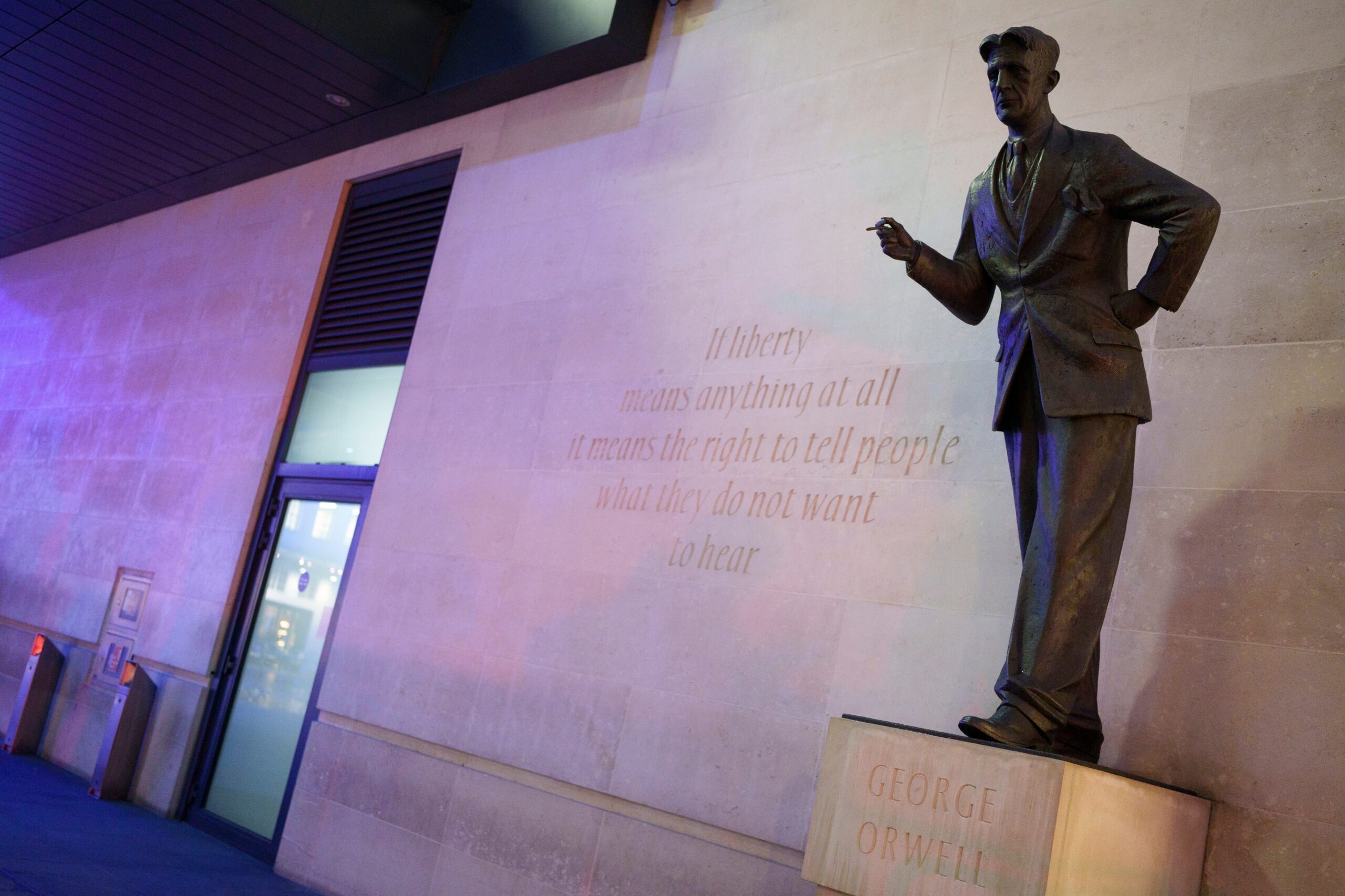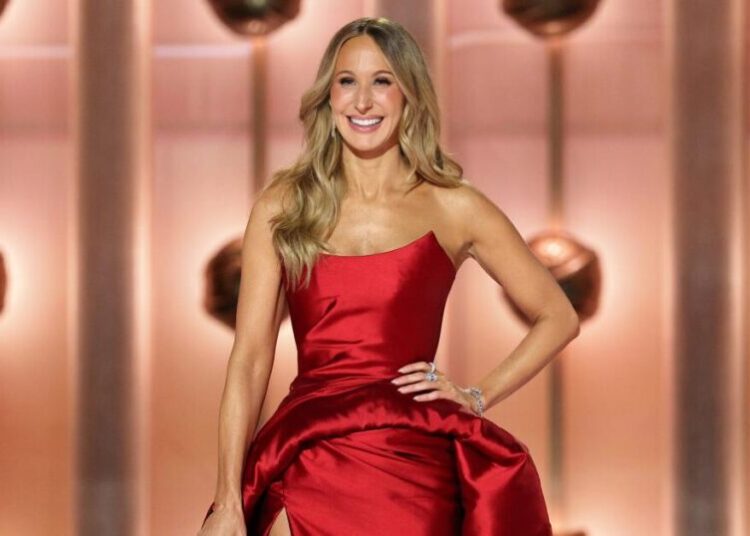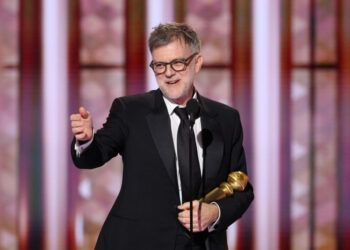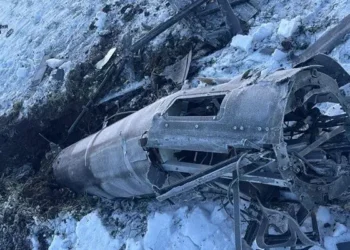
Outside the British Broadcasting Corporation’s main headquarters in the heart of London stands a statue of journalist and writer George Orwell smoking a cigarette. Reporters often cluster around to join him in the act, standing in front of the quotation etched into the wall beside the figure: “If liberty means anything at all, it means the right to tell people what they do not want to hear.”
Outside the British Broadcasting Corporation’s main headquarters in the heart of London stands a statue of journalist and writer George Orwell smoking a cigarette. Reporters often cluster around to join him in the act, standing in front of the quotation etched into the wall beside the figure: “If liberty means anything at all, it means the right to tell people what they do not want to hear.”
According to an internal memo to the BBC’s Editorial Guidelines and Standards Board leaked to the Daily Telegraph, it is the national broadcaster that needs to hear some hard truths. And President Donald Trump is making sure it does.
The 19-page memo, written by former Times of London journalist and former external adviser to the board Michael Prescott, details a long list of “troubling matters” related to political and ideological bias within the seemingly impartial public broadcaster. At the top of his list is “doctored” video footage of the president from the Jan. 6, 2021, riot, which aired on a program titled “Trump: A Second Chance?” a week before the 2024 election. The BBC’s investigative documentary arm, Panorama, spliced together comments Trump made an hour apart at the rally before the riot; this act, according to Prescott, “materially misled viewers.”
Did Trump’s comments from that day really need exaggerating? Could viewers not be trusted to make up their own minds about the president’s role in the storming of the Capitol? Perhaps the BBC’s editorial staff thought they couldn’t. Their doubt has played right into Trump’s hands. “These are very dishonest people who tried to step on the scales of a Presidential Election,” Trump wrote on Truth Social this week, before escalating into threats of a $1 billion lawsuit against the BBC. “What a terrible thing for Democracy!”
How the tables have turned.
In typical fashion, Trump has made the story about Trump. The BBC’s director general, Tim Davie, and news CEO, Deborah Turness, have resigned over the revelations, and the president is claiming victory. But the memo reveals far more about the perils of state-sponsored media: the kind the United States does not know and does not want to know.
Even before NPR and PBS saw their federal funding cut this year, most of their money came from private donors. Not true of the BBC, which relies on a “license fee” — a tax by any other name — which you must pay if you are a U.K. resident with a working television, even if you do not watch the BBC.
It is not an innocuous tax. It targets the poor, who receive letters threatening fines and imprisonment if they don’t pay and update their license yearly. Nor are they hollow threats: according to the latest statistics provided by the Ministry of Justice, unpaid license fees account for 12 percent of all female prosecutions in Britain.
It does not speak well to the quality of a product if government must force customers to pay for it and threaten vulnerable mothers with jail time if they don’t. It reveals a lack of confidence within the higher ranks of the BBC that they have not seriously considered a path to privatization or some kind of cooperative structure that would free them of these troubles.
After all, there is plenty to praise about the BBC’s editorial efforts. There is a reason journalists want to work for the broadcaster, pundits crave airtime and politicians sit down with presenters for lengthy grillings: It remains one of the most trusted news organizations with extensive reach. BBC World Service, a global radio program, is considered one of the best news sources in the world, particularly for listeners in countries with no free press. And the BBC hosts some of the most beloved, quintessentially British entertainment programs, such as “Strictly Come Dancing.”
Lots of people would happily pay to access these shows voluntarily. But moving to a subscription service would force the monolith to confront the uncomfortable truths buried beneath the Trump stuff in Prescott’s memo: mainly pitfalls in accuracy when reporting on social issues and even foreign affairs.
Over the years, viewers have noticed what the Standards Board failed to grasp. It is strange to hear BBC hosts talk around the truth about Hamas — a consequence of the BBC ruling that the group cannot be referred to as “terrorists.” Plenty of viewers quietly laughed when, earlier this year, newscaster Martine Croxall rolled her eyes and reworded “pregnant people” to “women” live on the air. Yet internally, she was found to have broken the rules. And no one has forgotten the BBC’s viral tweet in the summer of 2020: “27 police officers injured during largely peaceful anti-racism protests in London.” This is how the national broadcaster described people lobbing glass bottles and flares at British police — the vast majority of whom do not carry guns.
As the BBC navigates the leak and Trump’s fury, its friends are being a little too helpful. “The BBC isn’t perfect, but it belongs to Britain not Trump,” Liberal Democratic Party leader Ed Davey wrote on X. “Political leaders across the UK must unite in defending its independence from the White House.”
These comments by Davey — who sidelined the “liberal” and “Democrat” parts of his party in the last election to go bungee jumping and slip-n-sliding for the media — are a gift to BBC critics. If politicians are eager to offer a blanket defense of the broadcaster, it is probably not doing a good enough job of holding them to account.
No single media organization can claim to be the arbiter of truth. Competition makes us all better. American media may be bitterly divided, but hearing things you “do not want to hear” sometimes is, as Orwell identified, far better than the alternative.
The post The real peril the BBC memo reveals
appeared first on Washington Post.




